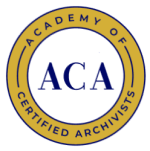Amanda Greenwood, Candidate for Regent for Outreach

PROFESSIONAL EXPERIENCE:
Bigelow Project Archivist Union College, January 2022-present
Reference and Processing Archivist Graduate Assistant University of Albany, SUNY, May 2021-December 2021
Preservation Graduation Assistant University of Albany, SUNY, July 2021-December 2021
Digitization Project Manager Historic Cherry Hill Museum, May 2021-August 2021
Anna Radkowski-Lee Web Archiving Graduate Assistant University of Albany, SUNY, October 2020- May 2021
EDUCATION:
- Master of Science in Information Science in Archives and Records Administration, University of Albany, SUNY: 2021
- Master of Liberal Arts in English, Harvard University: 2012
- Bachelor of Arts in English, University of Albany, SUNY: 2002
PROFESSIONAL ACTIVITIES:
- Academy of Certified Archivists: Member, 2021-present; Mentee Program Cohort, 2021-2022.
- Documentary Heritage and Preservation Services for New York: Mentee Program Cohort, 2021-2022.
- Society of American Archivists: Web Archiving Section Committee Member: 2021-present; Member, 2020-present.
- New York Archives Conference: Student Board Member, 2021-present.
- Mid-Atlantic Regional Archives Conference: Member, 2021-present.
- American Library Association: Member, 2020-present.
- Capital Area Archivists: Member, 2020-present.
- New York Library Association: Member, 2020-present.
- State University of New York Librarians Association: Member, 2020-present.
“What is the role of archival certification in the modern work environment?”
The word “modern” in the context of archives may remind people of Schellenbergian rhetoric, but modern archival theories and practices have evolved beyond the imagination of Schellenberg, especially in the past two years. While information professionals have always been at the forefront of changing technology and trends, today’s modern work environment requires archivists to be even more adaptable and open to accepting non-traditional challenges and working conditions. Presently, the variety of information professionals who work in roles handling archival records is myriad, and these roles are often found in institutions such as historical societies, governments, corporations, museums, and libraries. While they may not have the “archivist” title attached to their job description, they may perform all of the duties traditionally associated with that of an archivist. These professionals may not have a graduate degree in archival studies or library science, but they may have one that focuses on history, art, or another area relevant to the institution. For them, becoming a certified archivist means that they have passed the required levels of competency and shows that they understand the core knowledge required in the field. In addition, earning archival certification proves that they have the hours of professional experience and have applied archival theories in a practical sense. In the current competitive workforce, archivists look towards earning archival certification as evidence that they have the necessary credentials and understand the standards in the field. Moreover, it demonstrates a commitment to the profession by staying current about changing trends within the field. Not all archivists need archival certification, and not all information professionals need to be archivists, but the certification helps to close that gap that separates the title from the profession.
